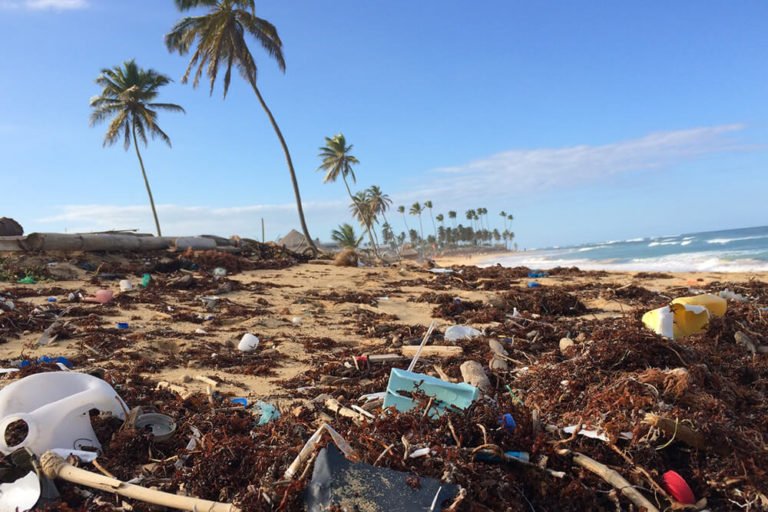Trash in Oceans and 7 Ways You Can Help

As World Oceans Day approaches, we’re taking a step back from our scuba gear to address a growing crisis: trash in our oceans. While this problem can seem far away while diving among beautiful coral reefs and marine life, it’s a serious issue that cannot be ignored.
It’s estimated that there are 5.25 TRILLION pieces of plastic in our oceans (that’s 13x the number of stars in the Milky Way). This pollution has a grave impact on the oceans we dive in. One of the most gruesome ways it has materialized is a “Giant Garbage Patch” in the North Pacific Ocean, spanning more than 7 million square miles.
THE IMPLICATIONS FOR MARINE LIFE
Trash is quickly beginning to outweigh the number of fish in the ocean, endangering the marine life we love and threatening their ecosystem.
Turtles, fish and seabirds often mistake pieces of trash for food. When they ingest it, it causes internal damage that can kill them. Even if they don’t accidentally eat the trash, they can still get tangled in it (think: plastic bags). Once entangled, these creatures have a hard time getting out, leading to injuries and death.
Whales are washing up on shore with stomachs full of plastic, while turtles are starving to death from thinking they’re full (when they’re really just full of plastic). Even the coral reefs are affected. Plastic has been shown to dramatically increase the likelihood of disease in coral reefs, threatening their existence and that of the marine life within them.
As grave as all this may sound, trash in our oceans is a problem we can help solve. By adopting green habits and a sustainable lifestyle, we can protect our oceans and sea life.
7 WAYS TO REDUCE TRASH IN THE OCEAN
SHOP SMARTER
Dangerous materials are lurking at the grocery store and shopping mall. By bringing reusable bags along on shopping trips, you can cut down on the plastic that ends up in the ocean.
BUY BAMBOO
Those plastic utensils you get from takeout restaurants may be convenient, but they’re killing our marine life. By switching to bamboo utensils, you can chow down with a clear conscience.
SIP RESPONSIBLY
Can’t kick the straw habit? Keep a reusable metal straw on hand so you can sip that iced latte sustainably. And if you’re thirsty for water, skip the plastic bottles in favor of reusable metal or glass containers.
SKIP STYROFOAM
Next time you go out to eat, bring your own take-home containers for leftovers. The styrofoam boxes commonly used at restaurants pollute the sea.
BULK UP
By purchasing your favorite products in bulk, you’ll cut down on packaging that ends up in the ocean. (Plus, you won’t have to make as many trips to the store!)
GO VINTAGE
Not only is vintage in, it’s green! By reusing clothing and avoiding fast fashion, you’ll reduce waste and look great doing it.
JOIN A CLEANUP
Join a local beach cleanup in your area to do your part to keep our oceans clean! CLICK HERE to find one near you.
HOW SCUBA DIVERS ARE HELPING (AND YOU CAN TOO)
Some divers are GOING THE EXTRA MILE by bringing trash collection bags with them on their dives. This is a great way to remove trash that isn’t as easily accessible to non-diving cleanup volunteers. By removing pieces of trash that get caught in reefs or sink to the ocean floor, you can enjoy your dive and save the sea at the same time.
The combined effort of the larger diving community can make a huge difference for the ocean and its marine life. Just make sure to LOG THE TRASH YOU FIND so that it gets recorded in the global database. This will work to support the development of policies that protect the sea!
THE OCEAN CONSERVANCY’S EFFORTS
The Ocean Conservancy has been fighting for our oceans for more than three decades. From cleanup events to awareness campaigns, they’ve united millions of volunteers from over 150 countries to help clean up our beaches. Over time, they’ve been able to rid beaches of more than 220 million pounds of trash!
The Ocean Conservancy also started the SKIP THE STRAW MOVEMENT. After more than 500,000 straws and stirrers were removed from beaches around the world, these silent killers made the top ten list for harmful trash found in the ocean. If just 25,000 people commit to skipping straws, we can rid the Earth of 5 million straws—saving the oceans and marine life in the process.
